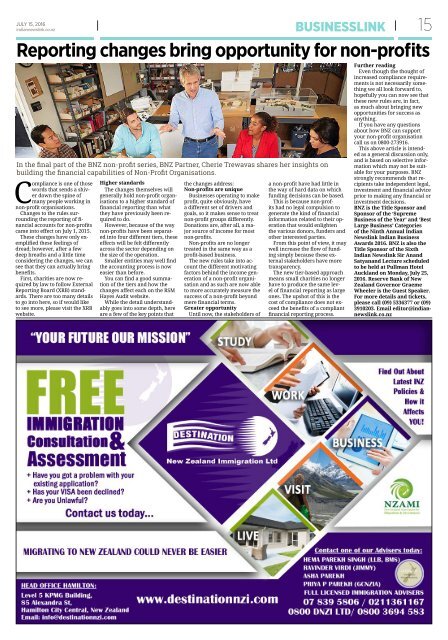Indian Newslink July 15 Digital Edition
You also want an ePaper? Increase the reach of your titles
YUMPU automatically turns print PDFs into web optimized ePapers that Google loves.
JULY <strong>15</strong>, 2016<br />
BUSINESSLINK <strong>15</strong><br />
Reporting changes bring opportunity for non-profits<br />
In the final part of the BNZ non-profit series, BNZ Partner, Cherie Trewavas shares her insights on<br />
building the financial capabilities of Non-Profit Organisations.<br />
Compliance is one of those<br />
words that sends a shiver<br />
down the spine of<br />
many people working in<br />
non-profit organisations.<br />
Changes to the rules surrounding<br />
the reporting of financial<br />
accounts for non-profits<br />
came into effect on <strong>July</strong> 1, 20<strong>15</strong>.<br />
These changes have only exemplified<br />
these feelings of<br />
dread; however, after a few<br />
deep breaths and a little time<br />
considering the changes, we can<br />
see that they can actually bring<br />
benefits.<br />
First, charities are now required<br />
by law to follow External<br />
Reporting Board (XRB) standards.<br />
There are too many details<br />
to go into here, so if would like<br />
to see more, please visit the XRB<br />
website.<br />
Higher standards<br />
The changes themselves will<br />
generally hold non-profit organisations<br />
to a higher standard of<br />
financial reporting than what<br />
they have previously been required<br />
to do.<br />
However, because of the way<br />
non-profits have been separated<br />
into four different tiers, these<br />
effects will be felt differently<br />
across the sector depending on<br />
the size of the operation.<br />
Smaller entities may well find<br />
the accounting process is now<br />
easier than before.<br />
You can find a good summation<br />
of the tiers and how the<br />
changes affect each on the RSM<br />
Hayes Audit website.<br />
While the detail understandably<br />
goes into some depth, here<br />
are a few of the key points that<br />
the changes address:<br />
Non-profits are unique<br />
Businesses operating to make<br />
profit, quite obviously, have<br />
a different set of drivers and<br />
goals, so it makes sense to treat<br />
non-profit groups differently.<br />
Donations are, after all, a major<br />
source of income for most<br />
non-profits.<br />
Non-profits are no longer<br />
treated in the same way as a<br />
profit-based business.<br />
The new rules take into account<br />
the different motivating<br />
factors behind the income generation<br />
of a non-profit organisation<br />
and as such are now able<br />
to more accurately measure the<br />
success of a non-profit beyond<br />
mere financial terms.<br />
Greater opportunity<br />
Until now, the stakeholders of<br />
a non-profit have had little in<br />
the way of hard data on which<br />
funding decisions can be based.<br />
This is because non-profits<br />
had no legal compulsion to<br />
generate the kind of financial<br />
information related to their operation<br />
that would enlighten<br />
the various donors, funders and<br />
other interested parties.<br />
From this point of view, it may<br />
well increase the flow of funding<br />
simply because these external<br />
stakeholders have more<br />
transparency.<br />
The new tier-based approach<br />
means small charities no longer<br />
have to produce the same level<br />
of financial reporting as large<br />
ones. The upshot of this is the<br />
cost of compliance does not exceed<br />
the benefits of a compliant<br />
financial reporting process.<br />
Further reading<br />
Even though the thought of<br />
increased compliance requirements<br />
is not necessarily something<br />
we all look forward to,<br />
hopefully you can now see that<br />
these new rules are, in fact,<br />
as much about bringing new<br />
opportunities for success as<br />
anything.<br />
If you have any questions<br />
about how BNZ can support<br />
your non-profit organisation<br />
call us on 0800-273916.<br />
This above article is intended<br />
as a general discussion only,<br />
and is based on selective information<br />
which may not be suitable<br />
for your purposes. BNZ<br />
strongly recommends that recipients<br />
take independent legal,<br />
investment and financial advice<br />
prior to making any financial or<br />
investment decisions.<br />
BNZ is the Title Sponsor and<br />
Sponsor of the ‘Supreme<br />
Business of the Year’ and ‘Best<br />
Large Business’ Categories<br />
of the Ninth Annual <strong>Indian</strong><br />
<strong>Newslink</strong> <strong>Indian</strong> Business<br />
Awards 2016. BNZ is also the<br />
Title Sponsor of the Sixth<br />
<strong>Indian</strong> <strong>Newslink</strong> Sir Anand<br />
Satyanand Lecture scheduled<br />
to be held at Pullman Hotel<br />
Auckland on Monday, <strong>July</strong> 25,<br />
2016. Reserve Bank of New<br />
Zealand Governor Graeme<br />
Wheeler is the Guest Speaker.<br />
For more details and tickets,<br />
please call (09) 5336377 or (09)<br />
3910203. Email editor@indiannewslink.co.nz


















